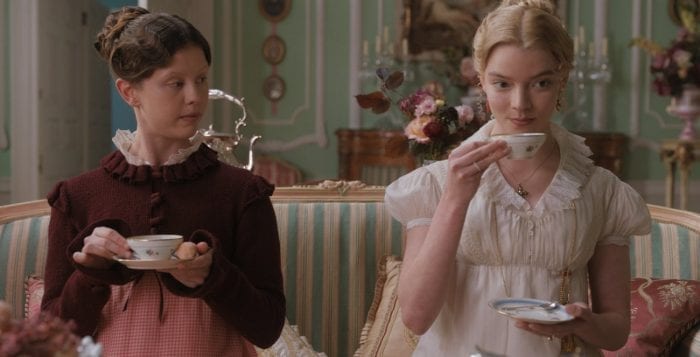By Jeffrey Sanzel
Jane Austen’s 1815 novel Emma is a sardonic comedy of manners that swirls around issues of love, marriage and social status. While perhaps not as popular as Pride and Prejudice, it has seen multiple stage, screen and television adaptations, most notably with the Emmas of Gwyneth Paltrow, Kate Beckinsale and Alicia Silverstone (renamed Cher) in Clueless, which moved the action to 1990s California. While its mischievous wit is unmatchable, there is a real commentary about human nature that underlies its humor.
Directed by Autumn de Wilde, from a screenplay by Eleanor Catton, Emma. has arrived, complete with a full-stop at the end of its title. (This is to indicate it is a “period” piece.) It is lush and rich and comical, with just a hint of a modern sensibility to separate it from its predecessors.
Austen opens the novel with a description of her complicated heroine:
Emma Woodhouse, handsome, clever, and rich, with a comfortable home and happy disposition, seemed to unite some of the best blessings of existence; and had lived nearly twenty-one years in the world with very little to distress or vex her.
This tongue-in-cheek portrait sets up one of the most meddling characters in all of English literature. Following closely to the book, the film opens with Emma having just succeeded at matchmaking her governess. With a taste for this endeavor, she now sets her sites on marrying off her friend Harriet Smith, a simple girl who is easily swayed by Emma’s every suggestion. What follows is a series of courtships and broken engagements, mismatches and misunderstandings, almost all due to Emma’s destructive and misplaced interferences. Like most comedic novels of this nature, it ends happily with multiple pairings, marriage being the ultimate goal.
The film’s peripatetic beginning has an almost farcical feel. The scenes are short, clipped and over-the-top. There are a good many laughs but it takes at least 20 minutes to land for more than a few moments. Ultimately, this is an intentional device. As the film progresses, this whimsical conceit shifts to an earnestness that matches Emma’s maturity. From childishly frenetic to wisely focused, the film and its protagonist grow. The true turning point comes when an off-hand barb wounds deeply. Confronted for her behavior, she realizes that it is time to look beyond herself. It is amazing that as the film begins to breathe in its journey, it picks up momentum: It slows to go quickly.
The performances are uniformly excellent. Emma’s father, who is equally afraid of drafts as he is of being alone, is played with perfect understatement by the redoubtable Bill Nighy; with the simple raise of an eyebrow, he manages to steal every scene in which he appears. Callum Turner avoids the clichés as he finds dimension in the seemingly narcistic Frank Churchill. Chloe Pirrie as Emma’s sister and Oliver Chris as her brother-in-law are one of cinema’s most hilariously unhappy couples. Myra McFayden’s chatterbox of a Mrs. Bates reveals painful dimension in her humility. Rupert Graves as the jolly if slightly flustered Mr. Weston is matched by Gemma Whelan as his self-assured wife. Mia Goth hits the right notes of naivete as Harriet Smith, the unfortunate object of Emma’s machinations. Josh O’Connor and Tanya Reynolds are amusingly vulgar as the minister and his new bride. Amber Anderson does the best she can with the underwritten Jane Fairfax. Connor Swindells’ innocent gentleman farmer infuses his few moments with genuine sweetness.
At the center of the film is Anya Taylor-Joy, luminous and wholly engaging as Emma. Taylor-Joy manages to be both insufferable and charming at the outset and then finds a natural and touching shift to self-awareness, ultimately embracing her adulthood. Even in stillness, there is a sense of Emma’s ever whirring brain. Johnny Flynn’s George Knightley is appropriately wry and astute, the pain in his growing love for Emma becoming the film’s center.
Christopher Blauvelt’s sumptuous cinematography has made every frame a celebration of Regency England. The film is lavish and credit must be given to the design team: Kave Quinn (production design), Alice Sutton (art direction), Stella Fox (set decoration) and, especially, Alexandra Byrne (for flawless and Oscar-bait costume design).
This Emma. is wonderfully conceived and thoroughly entertaining. It is a reminder of why Jane Austen is a cinematic favorite and why her works — and insights — are still fresh 200 years later. Rated PG.





